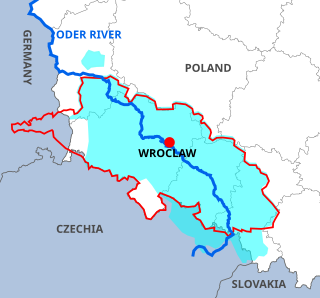
Silesia is a historical region of Central Europe that lies mostly within Poland, with small parts in the Czech Republic and Germany. Its area is approximately 40,000 km2 (15,400 sq mi), and the population is estimated at around 8,000,000. Silesia is split into two main subregions, Lower Silesia in the west and Upper Silesia in the east. Silesia has a diverse culture, including architecture, costumes, cuisine, traditions, and the Silesian language. The largest city of the region is Wrocław.

Upper Silesia is the southeastern part of the historical and geographical region of Silesia, located today mostly in Poland, with small parts in the Czech Republic. The area is predominantly known for its heavy industry, mining, and the Silesian language.

Lower Silesian Voivodeship, or Lower Silesia Province, in southwestern Poland, is one of the 16 voivodeships (provinces) into which Poland is divided. The voivodeship was created on 1 January 1999 out of the former Wrocław, Legnica, Wałbrzych and Jelenia Góra Voivodeships, following the Polish local government reforms adopted in 1998. It covers an area of 19,946 square kilometres (7,701 sq mi), and as of 2019 has a total population of 2,899,986.
Silberberg is German for "Silver Mountain" or "Silver Hill" and may refer to:

is a municipality and village in Frýdek-Místek District in the Moravian-Silesian Region of the Czech Republic. It has about 3,800 inhabitants. The municipality has a significant Polish minority.

Bukovec is a municipality and village in Frýdek-Místek District in the Moravian-Silesian Region of the Czech Republic. It has about 1,400 inhabitants. The municipality has a significant Polish minority.
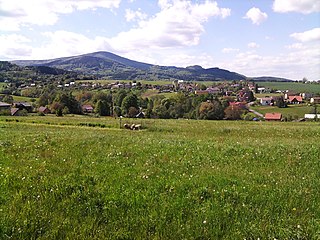
is a municipality and village in Frýdek-Místek District in the Moravian-Silesian Region of the Czech Republic. It has about 1,300 inhabitants. The municipality has a significant Polish minority.

is a municipality and village in the Karviná District in the Moravian-Silesian Region of the Czech Republic. It has about 1,400 inhabitants. The municipality has a significant Polish minority.

Lower Silesia is a historical and geographical region mostly located in Poland with small portions in the Czech Republic and Germany. It is the western part of the region of Silesia.

Horní Lomná is a municipality and village in Frýdek-Místek District in the Moravian-Silesian Region of the Czech Republic. It has about 400 inhabitants. The municipality has a significant Polish minority.
Silesia is a historical region in Central Europe.

is a village in Gmina Zebrzydowice, Cieszyn County, Silesian Voivodeship, southern Poland, on the border with the Czech Republic. It lies in the historical region of Cieszyn Silesia, on the Olza River.
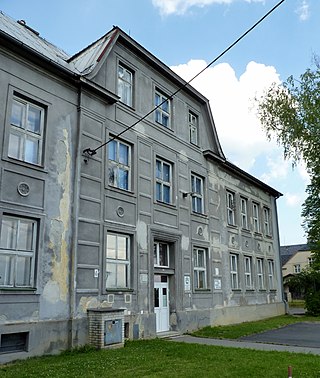
is a village in Karviná District, Moravian-Silesian Region, Czech Republic. It was a separate municipality but became administratively a part of Havířov in 1960. It has a population of 901 (2020). The village lies in the historical region of Cieszyn Silesia.

is a village in Karviná District, Moravian-Silesian Region, Czech Republic. It was a separate municipality but became administratively a part of Orlová in 1946. It has a population of 274.

is a village and the seat of Gmina Chybie in Cieszyn County, Silesian Voivodeship, southern Poland. It lies in the Upper Vistula Valley within Oświęcim Basin and in the historical region of Cieszyn Silesia. There is a nature reserve called Rotuz in the eastern part of the village.
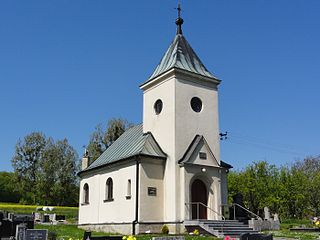
Godziszów is a village in Gmina Goleszów, Cieszyn County, Silesian Voivodeship, southern Poland, close to the border with the Czech Republic. The village lies in the Silesian Foothills, in the historical region of Cieszyn Silesia.
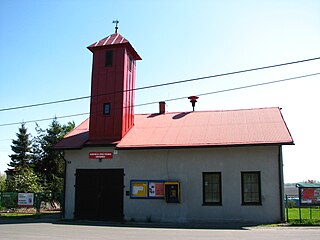
Kostkowice is a village in Gmina Dębowiec, Cieszyn County, Silesian Voivodeship, southern Poland.
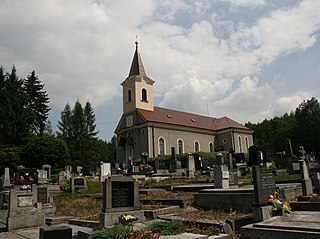
Prostřední Suchá is a village in Karviná District, Moravian-Silesian Region, Czech Republic. It was a separate municipality but became administratively a part of Havířov in 1960. It has a population of 4,595 (2020). The village lies in the historical region of Cieszyn Silesia.

The coat of arms of Lower Silesia, and simultaneously of Silesia, shows a black eagle with silver crescent with cross in the middle on its chest on a golden background. It has been assumed in the tradition that the coat of arms and colors of Lower Silesia are simultaneously used as symbols of Silesia as a whole.
















